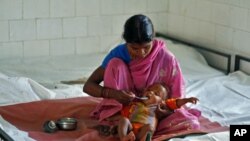Malnutrition in the 1,000 days from the early stages of pregnancy through the age of two, causes irreversible physical and mental damage in one out of every three children worldwide. That's according to Bread for the World Institute, an organization that aims to end hunger across the globe. The group convened a massive gathering Monday in Washington, D.C, in an effort to build political momentum for its cause - improving nutrition for pregnant women and infants around the world.
In the Indian state of Tamil Nadu, infant mortality is dropping. Free prenatal care, offered close to home, is the key to India’s campaign to reduce maternal and infant deaths. Health clinic workers teach mothers how to meet their babies’ nutritional needs and how to sustain themselves with proper foods while pregnant.
“I come every two weeks for a check-up and they give me the medication and supplements I need," said one pregnant young woman, Sunati, in Tamil. "They also ask me to eat a lot of greens, iron-rich foods and eggs.”
Malnutrition among pregnant women and infants was the focus of the conference. Hundreds of aid workers and activists gathered to build political momentum for nutrition efforts they say could save 1 million children every year.
Asma Lateef is with Bread for the World, which aims to end hunger worldwide.
"We know now that if you miss the 1,000 days window of opportunity between pregnancy and age two, the impact on a child is irreversible," said Lateef. "There is nothing you can do to make up for malnutrition during that critical window of opportunity.”
Lateef said efforts as simple as hand-washing - to reduce diarrhea - and breast-feeding - the healthiest alternative for infants - go a long way toward fighting malnutrition. And she said these relatively cheap investments on the front-end save nations money down the line.
“Countries with a high burden of malnutrition - and there are 36 countries in the world that have a high burden of malnutrition - for those countries they lose two percent to three percent of their gross national product or their national income because of malnutrition," she said. "That’s a catastrophic loss… ”
Global nutrition activists hope to make theirs a more popular cause. U.S. Secretary of State Hillary Clinton has given weight to their efforts. She launched the One Thousand Days Partnership at the U.N. Development Goals Summit last year. The aim: ending child malnutrition.
“The Obama administration has put women and children at the heart of our development efforts, including our global health initiative - a $63-billion initiative to strengthen maternal and child health, family planning, nutrition," said Clinton.
Maternal and infant nutrition experts say those countries struggling with chronic hunger must take the lead in combating their nations’ problems, backed up by wealthy donor nations delivering sustained support.















